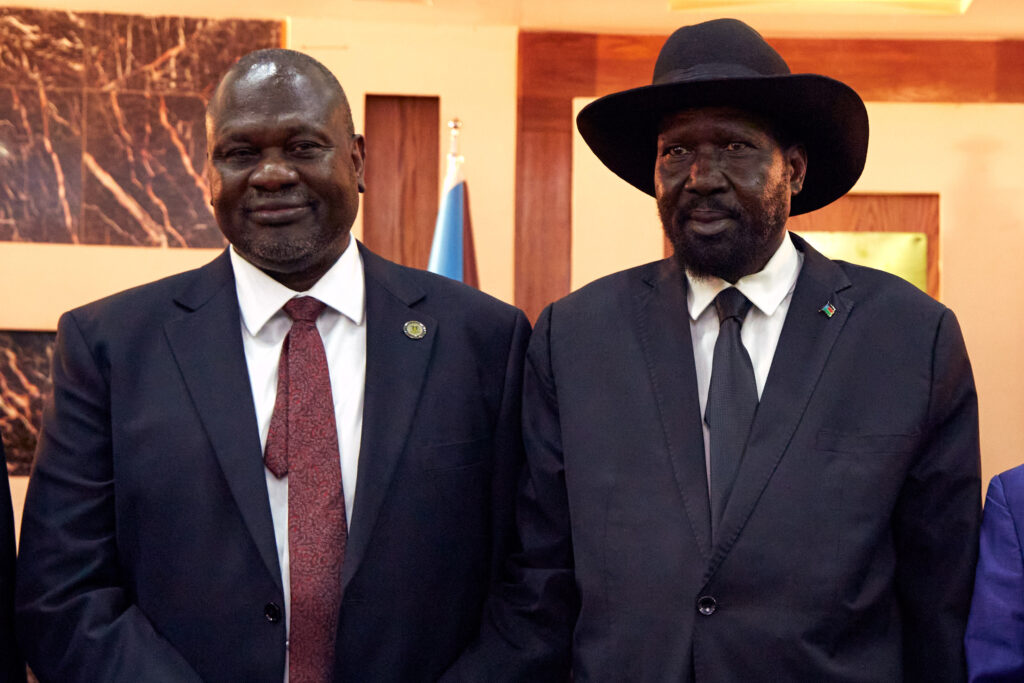South Sudan’s opposition said one of its army bases near the capital Juba was bombed late Monday as Washington warned it was “deeply concerned” by escalating violence between rival factions.Clashes between forces allied to President Salva Kiir and his long-time rival, First Vice President Riek Machar, have left their 2018 power-sharing agreement increasingly fragile and threaten to plunge the country back into civil war.The renewed insecurity in the world’s youngest nation has prompted concerns from regional partners, with Uganda — which has a long history of intervening in South Sudan — deploying troops to Juba this month. Uganda’s involvement was condemned by Machar’s party, the Sudan People’s Liberation Movement-in-Opposition (SPLM-IO), which said it was a breach of a United Nations arms embargo. The SPLM-IO said its military cantonment at Wunaliet, around 15 kilometres (nine miles) from Juba, was attacked on Monday.”This provocative action is a violation of the (2018 peace agreement),” a spokesperson said in a statement.Lul Ruai Koang, spokesman for the Kiir-aligned army, earlier warned that Machar’s forces in the area were “scaling up their movements” and had sent out a patrol towards army positions “clearly in military formation”. The army was yet to confirm the later strikes, but local media reported that it consisted of “heavy shelling”.South Sudan gained independence in 2011 and soon after fell into a five-year civil war between Kiir and Machar that killed some 400,000 people until a peace deal in 2018 brought them into a unity government.- ‘Not even a rat’ -Machar’s SPLM-IO said the presence of Ugandan forces was a “grave violation” of the peace agreement.”The Ugandan military entered South Sudan fully equipped with armoured and air-force units in violation of the UN Security Council resolution”, the SPLM-IO said, referencing the arms embargo that is in place until at least May this year.The statement, issued over the weekend but publicised on Monday, claimed Ugandan forces were “currently taking part in air strikes against civilians” in Upper Nile and Jonglei states.Ugandan army chief Muhoozi Kainerugaba, known for his unfiltered posting on X, warned Tuesday that the SPLM-IO’s military wing were “about to be annihilated”.”Our airforce is doing a great job of destroying them,” he posted, saying they should surrender “to me as soon as possible”.”Otherwise, not even a rat will survive in Nuer country,” he added.- ‘Teetering on the edge’ -The focus of recent clashes has been Nasir County in the northeastern Upper Nile State.A loose band of armed youth known as the White Army, allied to Machar, overran a military base in Nasir in early March.The army responded with aerial strikes in nearby areas, including the use of bombs containing a highly flammable liquid that acts as an accelerant upon explosion, according to a statement Monday by Nicholas Haysom, head of the UN Mission in South Sudan (UNMISS). “These indiscriminate attacks on civilians are causing significant casualties and horrific injuries, especially burns,” Haysom said, adding that an estimated 63,000 people have been displaced.The UN envoy said the country was “teetering on the edge of a relapse into civil war”.Analysts say Kiir has been taking steps in recent months to sideline Machar, promoting new members to the cabinet without consultation as the 73-year-old prepares his succession. Last week, he replaced the Machar-allied governor of Upper Nile State with one of his own allies. Machar’s party says 22 of its political and military members have been detained since February, including Petroleum Minister Puot Kang Chol and deputy army chief General Gabriel Duop Lam.On Monday, the United States State Department said Kiir and Machar “must engage in direct dialogue to curb escalating violence in South Sudan”. “Non-state militia attacks, govt-backed airstrikes, and promotion of sanctioned officials to high office are deeply concerning,” it said in a statement on X. UNICEF said Monday that South Sudan, one of the poorest countries in the world, was suffering its worst cholera outbreak since independence, with almost 700 deaths in six months, including many children.
